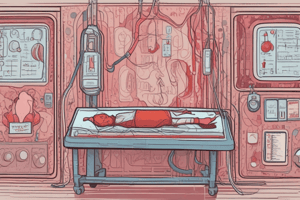Podcast
Questions and Answers
When does the effect of delayed hemolytic transfusion reactions typically become noticeable?
When does the effect of delayed hemolytic transfusion reactions typically become noticeable?
- Immediately after transfusion
- 14-21 days after transfusion
- 3-5 days after transfusion
- 7-10 days after transfusion (correct)
How does delayed hemolytic transfusion reaction affect the level of antibodies?
How does delayed hemolytic transfusion reaction affect the level of antibodies?
- Antibody level is not affected by the transfusion
- Antibody level remains unchanged after transfusion
- Antibody level decreases immediately after transfusion
- Antibody level rises within days after transfusion (correct)
What is the mechanism for red blood cell destruction in delayed hemolytic transfusion reactions?
What is the mechanism for red blood cell destruction in delayed hemolytic transfusion reactions?
- Intravascular destruction
- Extra vascular destruction (correct)
- Hemolysis due to temperature changes
- Phagocytosis by white blood cells
What characterizes delayed hemolytic transfusion reactions?
What characterizes delayed hemolytic transfusion reactions?
What causes delayed hemolytic transfusion reactions?
What causes delayed hemolytic transfusion reactions?
How long does it typically take for the effects of delayed hemolytic transfusion reactions to become noticeable?
How long does it typically take for the effects of delayed hemolytic transfusion reactions to become noticeable?
What is the mechanism of red blood cell destruction in delayed hemolytic transfusion reactions?
What is the mechanism of red blood cell destruction in delayed hemolytic transfusion reactions?
How is delayed hemolytic transfusion reaction different from acute hemolytic transfusion reaction?
How is delayed hemolytic transfusion reaction different from acute hemolytic transfusion reaction?
What characterizes the antibodies involved in delayed hemolytic transfusion reactions?
What characterizes the antibodies involved in delayed hemolytic transfusion reactions?
Why does delayed hemolytic transfusion reaction result in fever, hyperbilirubinemia, and failure to achieve the expected rise in Hb?
Why does delayed hemolytic transfusion reaction result in fever, hyperbilirubinemia, and failure to achieve the expected rise in Hb?
Flashcards are hidden until you start studying
Study Notes
Delayed Hemolytic Transfusion Reactions
Characteristics
- Delayed hemolytic transfusion reactions are characterized by the production of antibodies against donated red blood cells.
- These reactions typically become noticeable 3-14 days after transfusion.
Mechanism of Red Blood Cell Destruction
- Red blood cell destruction occurs through the immune-mediated process of antibody-mediated hemolysis.
Causes
- Delayed hemolytic transfusion reactions are caused by the production of antibodies against donated red blood cells, often as a result of previous transfusions or pregnancies.
Antibody Characteristics
- The antibodies involved in delayed hemolytic transfusion reactions are usually IgG antibodies, which can cross the placenta and cause hemolytic disease in the fetus.
Comparison to Acute Hemolytic Transfusion Reactions
- Delayed hemolytic transfusion reactions differ from acute hemolytic transfusion reactions in their timing and severity, with delayed reactions occurring days to weeks after transfusion and often being less severe.
Clinical Presentation
- Delayed hemolytic transfusion reactions result in fever, hyperbilirubinemia, and failure to achieve the expected rise in Hb due to the destruction of transfused red blood cells.
Studying That Suits You
Use AI to generate personalized quizzes and flashcards to suit your learning preferences.



